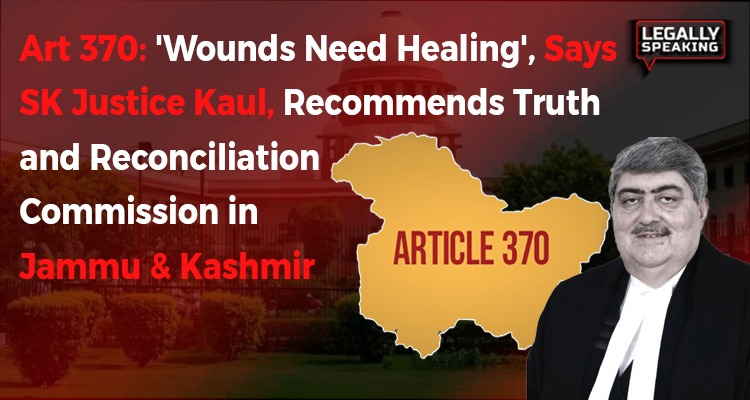
Supreme Court Justice Sanjay Kishan Kaul recommended on Monday the establishment of an “impartial truth and reconciliation commission” to investigate and report on human rights violations by both state and non-state actors in Jammu and Kashmir since the 1980s, asserting that the “wounds need healing.”
Justice Kaul, in a separate but concurring verdict, supported the Centre’s decision to revoke Article 370, which granted special status to Jammu and Kashmir.
Hailing from the region, Justice Kaul expressed empathy for the heavy toll borne by men, women, and children in the area due to the volatile situation. He emphasized the profound consequences of inter-generational trauma on an already fractured society during his travels.
“I cannot help but feel anguish for what people of the region have experienced and am constrained to write this Epilogue,” he stated in his 121-page verdict.
Justice Kaul further acknowledged numerous reports documenting human rights violations in the region over the years. He asserted that truth-telling provides victims with an opportunity to share their stories, leading to acknowledgment from those responsible and society as a whole, paving the way for reconciliation. Drawing on global examples, he highlighted the effectiveness of truth and reconciliation commissions, citing South Africa’s commission during apartheid.
He mentioned that in the past, various sections of the Kashmir valley have also called for the establishment of a truth and reconciliation commission.
“In view of the in-roads made globally, and endogenous requests for truth and reconciliation, I recommend the setting up of an impartial truth and reconciliation commission. The commission will investigate and report on the violation of human rights both by State and non-State actors perpetrated in Jammu & Kashmir at least since the 1980s and recommend measures for reconciliation,” he stated.
“In order to move forward, the wound needs healing,” noted Justice Kaul, emphasizing the need for the expedient establishment of this commission “before memories fade,” and he stressed that the process should be time-bound.
Justice Kaul acknowledged the distrust among the youth and emphasized the government’s duty to devise the commission’s structure and determine the best way forward. Former Jammu and Kashmir Chief Minister Omar Abdullah’s calls for a truth and reconciliation commission were also noted.
Recognizing the challenge of recommending such a panel falling beyond the court’s jurisdiction, Justice Kaul argued that transitional justice aligns with transformative constitutionalism. He emphasized the constitutional duty to investigate violations and proposed that the truth and reconciliation commission align with constitutionalism.
Referring to past court decisions, Justice Kaul cautioned that the commission should not function as a criminal court but adopt a humanized and personalized process based on dialogue, inclusiveness, and the principles of ‘ubuntu.’ He envisioned a reparative approach facilitating forgiveness and the formation of a shared national identity.
Justice Kaul concluded that the commission is one avenue toward systemic reform and expressed hope for achieving much when Kashmiris embrace the past, allowing those compelled to migrate to return with dignity.




